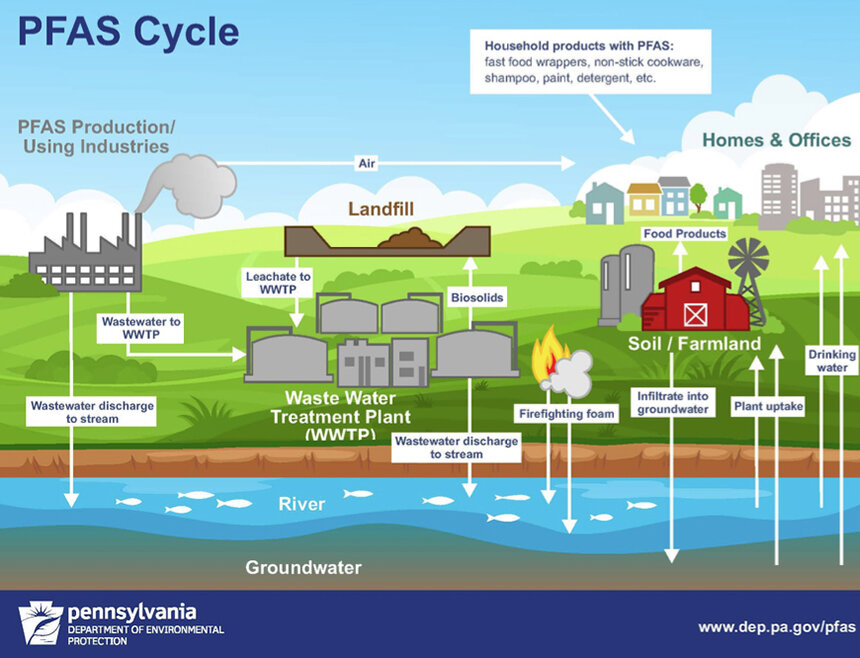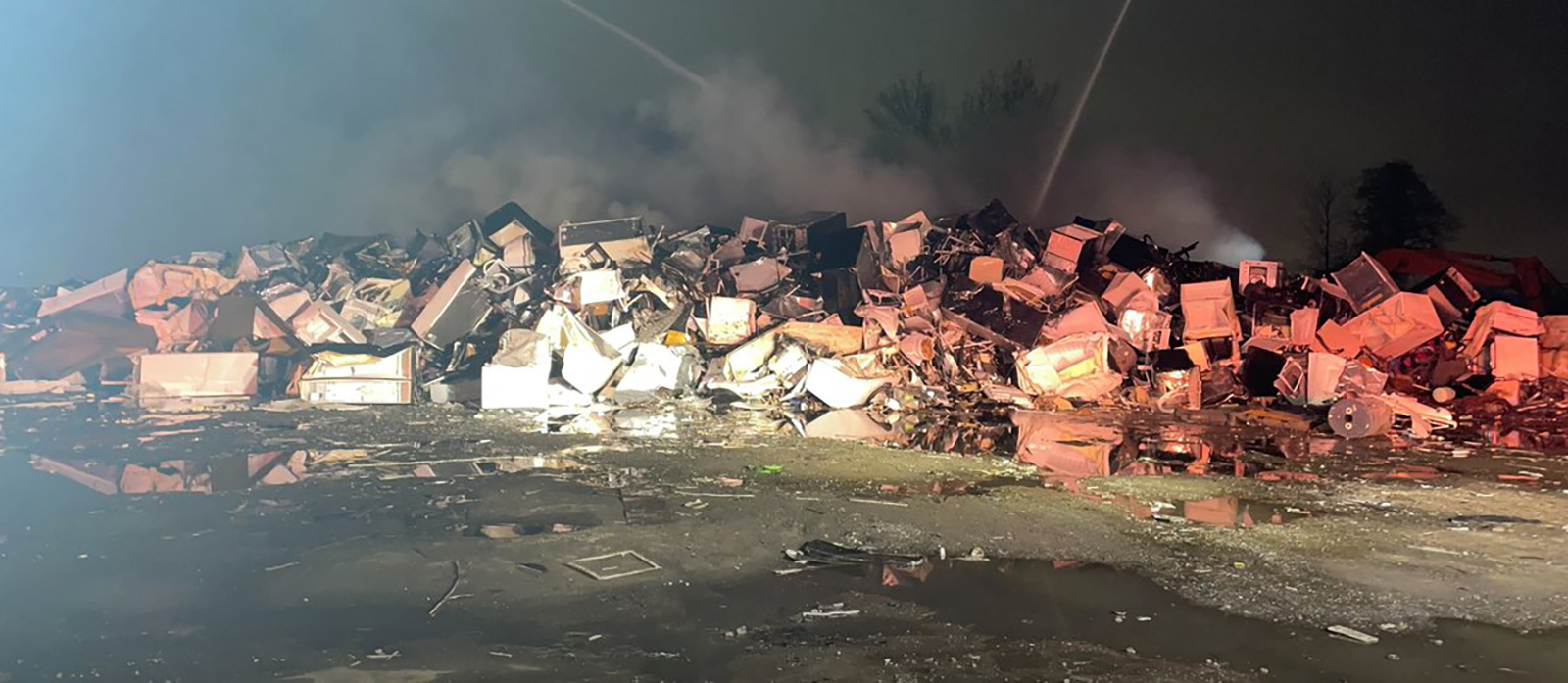Local and National Concerns Continue to Emerge About PFAS
Two bills in Rhode Island General Assembly would take immediate action on this class of chemicals
March 2, 2020
PROVIDENCE — Efforts to regulate a harmful class of chemicals known as PFAS, short for per- and polyfluoroalkyl substances, are advancing at state agencies and academic institutions, but Rhode Island legislative efforts and long-term solutions are less clear.
Funded by a $9 million federal research grant, a program led by the University of Rhode Island and Harvard University is producing noteworthy results and many questions.
Sources, Transport, Exposure & Effects of PFASs (STEEP) researchers have found that PFAS are linked to thyroid disease, low birth weight, and cardiovascular disease by increasing cholesterol levels, among other side effects.
PFAS are called “forever chemicals” because they don’t break down in the environment and end up in wastewater treatment systems and drinking-water supplies. Humans can flush PFAS from their bodies in their urine, but these harmful chemicals also seep into the bloodstream and breast milk and pass through the placenta to a fetus. These chemicals have been linked to cancers and weakened immune systems.
Little is also known about the effects of PFAS on wildlife and ecosystems. Researchers have found PFAS, along with plastics, in birds that live in coastal regions.
“We are still figuring out for humans, (yet) we are just so far behind on what these are doing in the environment,” said researcher and URI doctoral candidate Anna Robuck, in one of a series of PFAS educational videos produced by STEEP.
During the past 20 years, there has been little urgency at the federal level to regulate PFAS, although related classes of chemicals were voluntarily phased out nationally by chemical companies beginning in 2000. But short-chain PFAS are still used in familiar products such as water-repellent clothing and takeout food containers.
PFAS have been detected nationwide, with high concentrations in states with chemical manufacturing and military bases such as Michigan, New Jersey, and New York.
PFAS used in firefighting foam are blamed for the closure of private wells and the entire Oakland Village Water System in Burrillville in 2017. The fire suppressant is also the likely source for massive concentrations in wells at the Quonset State Airport in North Kingstown. The Rhode Island departments of health and environmental management, so far, have tested all schools with private water supplies and wells and reservoirs used by 87 percent of residents.
That response is considered one of the most extensive by any state. The testing and research that began in 2017 will eventually set acceptable PFAS thresholds in drinking water and groundwater. After saying in 2019 that they prefer to wait for federal guidance, state officials are now following the lead of other states by setting their own standards. Draft safety regulations are expected in mid-May, with final rules expected later in the year.
Two bills in the General Assembly would take more immediate action. House and Senate versions of the same bill require municipal water systems to treat their water or offer an alternative source of drinking water if levels exceed 20 parts per trillion. A second bill bans the use of PFAS in food packaging.
“The best way to get the material out of the environment is to eliminate it at the source,” Terrence Gray, the Rhode Island Department of Environmental Management’s deputy director of environmental protection, said at a Feb. 27 Senate committee hearing.
Gray said DEM “generally supports” the bills, while the state agency is putting together standards for water leeching from landfills and other sources of surface water. DEM provides bottled water when wells are closed, and, so far, has collected and disposed of 3,000 gallons of firefighting foam containing PFAS.
Maine and Vermont have passed safety standards for PFAS, while Rhode Island’s state toxicologist, Michael Byrns, said the Ocean State is striking a balance between moving quickly and moving deliberately so that it can learn how PFAS regulations are being implemented in other states. He noted that New Hampshire was swiftly sued after passing the strictest PFAS standards in the nation, in 2019. Chemical giant 3M, a biosolids fertilizer company, a dairy farm, and municipal water districts — all sources of PFAS — are suing the Granite State for passing the regulations.
Byrns said Rhode Island must adhere to the process set by the federal Safe Drinking Water Act and the Environmental Protection Agency (EPA), which require that states determine the economic impact of new regulations and conduct a cost-benefit analysis of rules before they can make changes to clean water regulations.
“It’s a process that takes time,” Byrns said at the recent Senate hearing.
Longer term, there are other types of PFAS that are untested or simply unknown.
“There are over 3,000 on the market and it’s too challenging to regulate and understand them one by one,” said Angela Slitt, a STEEP researcher and an associate professor in URI’s College of Pharmacy.
Chemical and plastics companies, led by the influential American Chemistry Council, are opposing any regulations and call for “science-based” evidence and guidance from the Food and Drug Administration before safety thresholds and bans are adopted.
But Slitt noted there is little evidence that short-chain PFAS are safer than their predecessors. She said research hasn’t proven such claims that they are less harmful because they have a shorter half-life than long-chain PFAS.
“I really don’t think we have enough evidence to completely comprehend that,” Slitt said.
Environmental groups such as the Conservation Law Foundation (CLF) and Clean Water Action are leading multi-state campaigns to regulate PFAS through legislation. At the Feb. 27 Senate hearing, James Crowley, staff attorney for CLF, noted that chemical companies such as DuPont and 3M have known about the health risks of PFAS for 40 years.
“But they prioritized profit over public health,” he said.
In a sign that the EPA may be taking the PFAS threat seriously, Bloomberg recently reported that the federal agency may issue legal limits for PFAS this year, while also looking into criminal investigations of polluters. But skeptics note the Trump administration’s track record of loosening health and environmental regulations and reduced oversight of corporate law-breaking.
“Holding polluters criminally accountable is hardly the calling card of the Trump administration,” said Ken Cook, president of the chemical research and health advocacy organization Environmental Working Group. “That is why the public must demand EPA pursue all legal actions against 3M, Chemours, DuPont, and other corporate bad actors responsible for any crimes committed in the craven pursuit of profits over human health.”
Categories
Join the Discussion
View CommentsRecent Comments
Leave a Reply
Related Stories
Your support keeps our reporters on the environmental beat.
Reader support is at the core of our nonprofit news model. Together, we can keep the environment in the headlines.
We use cookies to improve your experience and deliver personalized content. View Cookie Settings




Fluoride should be banned as well. Neurotoxin banned in 98% of Europe!!!!